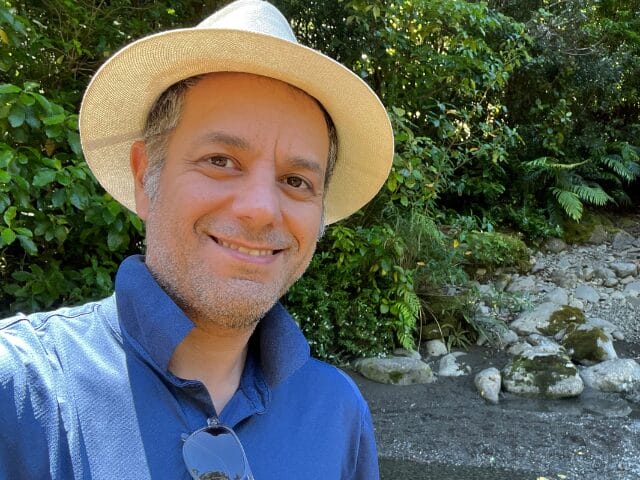
Amir Alipour is an Associate Geotechnical Engineer based in Wellington, New Zealand. With 15 years of geotechnical experience, spanning mining, residential, petrochemical, and industrial projects across Iran, South Africa, and New Zealand.
Amir’s professional focus specialisation encompasses slope stability analysis, foundation design, site response analysis for seismic events, liquefaction assessment, and engineering design, a critical consideration in Wellington due to the seismic environments within the built environment.
Amir will be sharing his insights and presenting at the NZTA Bridge and Geotechnical Conference 2024 – a conference bringing together the leading minds in the structural and geotechnical engineering segments of the NZ infrastructure sector. Here Amir shares some of his insights on his technical expertise and career.
My current research presented at the New Zealand Bridge Conference, is titled “A Framework for Defining Yield Acceleration as the Seismic Capacity of Slope Stability.” This work is a collaborative effort with my colleague Andreas Giannakogiorgos who is a Senior Principal at Tetra Tech Coffey. It stems from the fact that Wellington has very high seismicity. The new research indicates that the seismic levels here are even higher than previously expected. My research aims to provide a better understanding of the seismic capacity of slopes, which is crucial for infrastructure like roads and bridges. This research uses a range of methodologies to improve predictions and enhance safety.
What are some of the challenges your work is helping clients address?
Wellington is situated in a region with significantly high seismic risk, closely positioned to active seismic faults. The behaviour of the ground during seismic events is characterized by numerous uncertainties. The unknown responses on a large scale present a formidable challenge, particularly for infrastructure located near slopes. My primary objective has been to enhance our understanding of the seismic behaviours of slopes. To achieve this, I’ve employed innovative methodologies that span a spectrum from simple approaches to more complex analyses. Hence, the objective is to promote the reliability of seismic slope stability predictions, aiding decision-makers.
What excites you most about your industry right now?
The rapid pace of change brings forth new ideas and technologies on a daily basis. As engineers, it’s crucial for us to stay current and remain relevant within the industry. I’m genuinely enthusiastic about continuously updating my knowledge and skill set, ensuring that I can apply them effectively to projects. Furthermore, I find excitement in tackling new challenges. These challenges serve as opportunities for growth and learning, allowing me to evolve both personally and professionally.
Can you tell us what your area of expertise focuses on?
My professional focus centres around creating evaluations and designing solutions for a wide range of structures. These include residential, non-residential, and industrial projects. I specialize in various aspects such as slope stability analysis, shallow and deep foundation design, site response analysis for seismic events, liquefaction assessment, and retaining wall design. Here in Wellington, a fascinating area of interest for me lies in the seismic evaluation of existing older buildings. This unique context motivates me to engage more with structural engineers and explore innovative approaches to enhance their safety and resilience.
What do you most enjoy about your role and working at Tetra Tech Coffey?
Networking within a vast community of experts provides a valuable opportunity for knowledge sharing and collaboration. Being part of this extensive network feels like belonging to a large family of professionals, and that sense of connection brings joy and fulfillment.
Could you share a bit about your career journey and background?
Certainly. I have 15 years of geotechnical experience, focusing solely on geotechnics. I began my career in Iran, where I worked on dam design and analysis, ground improvement, and seismic design in Tehran. Later, I moved to South Africa and worked mainly in the mining industry. Before coming to New Zealand, I was also involved in petrochemical projects in southern Iran. Each experience has taught me something new, contributing to a diverse yet focused career in geotechnics.
What do you enjoy most about your work at Tetra Tech Coffey?
The collaborative environment at Tetra Tech Coffey is something I truly value. We have a vast network of experts from different backgrounds, and the ability to reach out and share knowledge quickly is invaluable. It feels like being part of a big family where everyone supports each other, which makes my work here particularly rewarding.
Amir’s current research, presented at the New Zealand Bridge Conference, focuses on defining yield acceleration as the seismic capacity of slope stability. His work, co-authored with Andreas, addresses the critical issue of seismic activity in Wellington, aiming to enhance predictive models for slope behavior during earthquakes. This research is applicable to infrastructure projects, including roads and bridges, where understanding slope stability is crucial for safety and resilience.
Connect with Amir at [email protected]